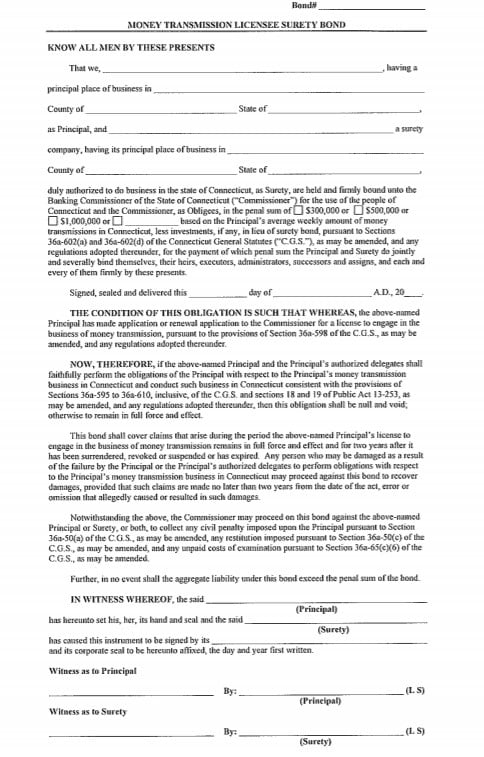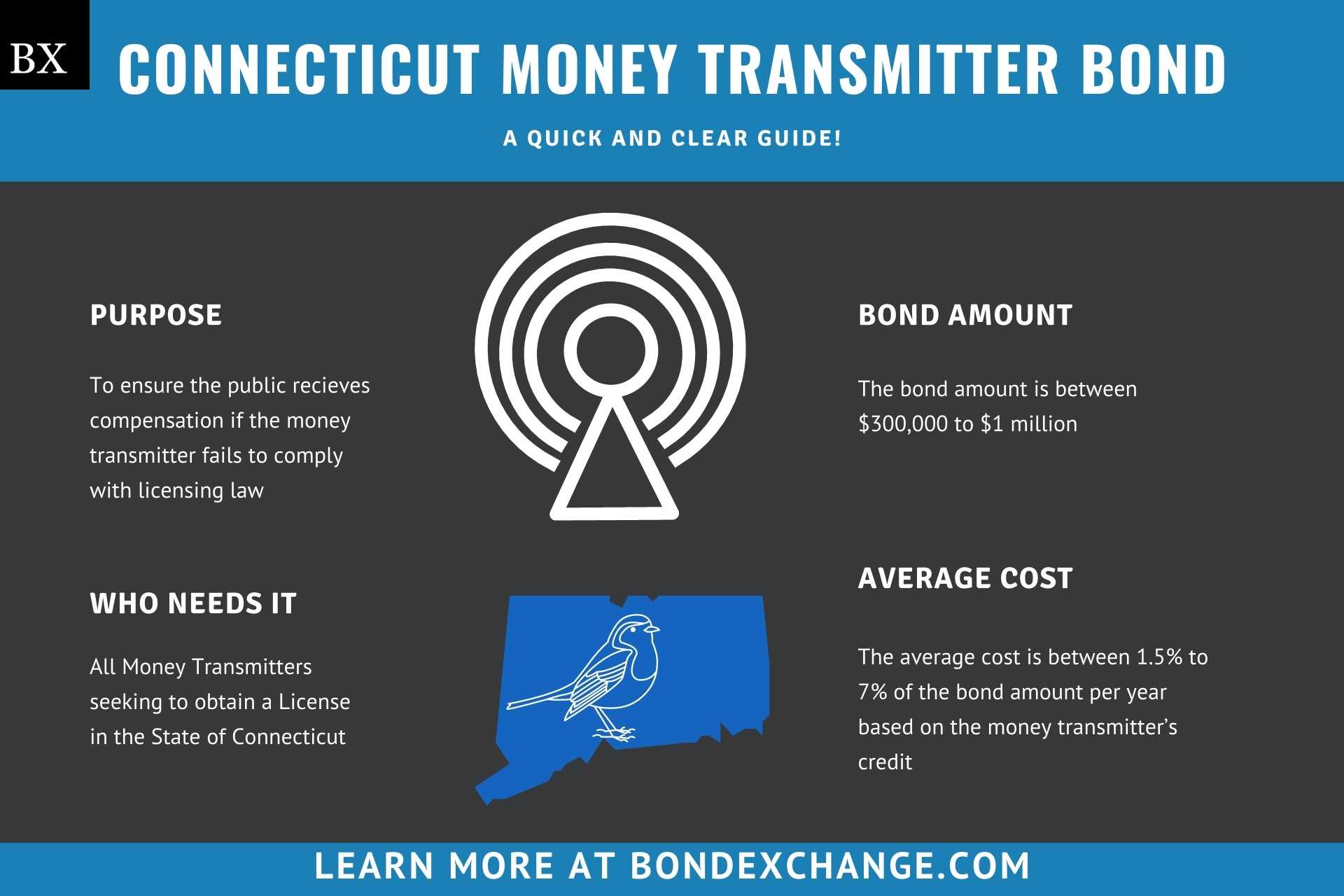Connecticut Money Transmitter Bond: A Comprehensive Guide
This guide provides information for insurance agents to help money transmitters obtain Connecticut Money Transmitter Bonds
At a Glance:
- Lowest Cost: 1.5% of the bond amount per year based on the money transmitter’s credit
- Bond Amount: Between $300,000 to $1 million (more on this later)
- Who Needs it: All Money Transmitters seeking to obtain a License in the State of Connecticut
- Purpose: To ensure the public receives compensation if the money transmitter fails to comply with licensing law
- Who Regulates Money Transmitters in Connecticut: The Connecticut Department of Banking

Background
Connecticut Statute 36a-597 requires all money transmitters operating in the state to obtain a license with the Department of Banking. The Connecticut legislature enacted the licensing laws and regulations to ensure that money transmitters engage in ethical business practices. In order to provide financial security for the enforcement of the licensing law, money transmitters must purchase and maintain a surety bond to be eligible for licensure.
What is the Purpose of the Connecticut Money Transmitter Bond?
Connecticut requires money transmitters to purchase a surety bond as part of the application process to obtain a business license. The bond ensures that the public will receive compensation for financial harm if the money transmitter fails to comply with the licensing regulations. In short, the bond is a type of insurance that protects the public if the money transmitter breaks licensing laws.
How Can an Insurance Agent Obtain a Connecticut Money Transmitter Surety Bond?
BondExchange makes obtaining a Connecticut Money Transmitter Bond easy. Simply login to your account and use our keyword search to find the “money” bond in our database. Don’t have a login? Gain access now and let us help you satisfy your customers’ needs. Our friendly underwriting staff is available by phone (800) 438-1162, email or chat from 7:30 AM to 7:00 PM EST to assist you.
At BondExchange, our 40 years of experience, leading technology, and access to markets ensures that we have the knowledge and resources to provide your clients with fast and friendly service whether obtaining quotes or issuing bonds.
Not an agent? Then let us pair you with one!
Click the above image to find a BX Agent near you
How is the Bond Amount Determined?
Connecticut Statute 36a-602 states that the bond amount must be the following:
- $300,000 for money transmitters with an average daily balance of outstanding Connecticut payment instruments during the two previous reporting quarters of $300,000 or less. Or any licensee that engages in the business of money transmission with an average weekly amount of monetary value received or transmitted, whichever amount is greater, during the two previous reporting quarters of $150,000 or less.
- $500,000 for money transmitters with an average daily balance of outstanding Connecticut payment instruments during the two previous reporting quarters of greater than $300,000 but less than $500,000. Or any licensee that engages in the business of money transmission with an average weekly amount of money or monetary value received or transmitted, whichever amount is greater, during the two previous reporting quarters of greater than $150,000 but less than $250,000.
- $1 million for any money transmitter with an average daily balance of outstanding Connecticut payment instruments during the two previous reporting quarters equal to or greater than $500,000 or any licensee that engages in the business of money transmission with an average weekly amount of money or monetary value received or transmitted, whichever amount is greater, during the two previous reporting quarters of $250,000 or greater.
Is a Credit Check Required for the Connecticut Money Transmitter Bond?
Surety companies will run a credit check on the owners of the money transmission company to determine eligibility and pricing for the Connecticut Money Transmitter bond. Owners with excellent credit and work experience can expect to receive the best rates. Owners with poor credit may be declined by some surety companies or pay higher rates. The credit check is a “soft hit”, meaning that the credit check will not affect the owner’s credit.
How Much Does the Connecticut Money Transmitter Bond Cost?
The Connecticut Money Transmitter surety bond can cost anywhere between 1.5% to 7% of the bond amount per year. Insurance companies determine the rate based on a number of factors including your customer’s credit score and experience. The chart below offers a quick reference for the approximate bond cost on a $300,000 bond requirement.
$300,000 Money Transmitter Bond Cost
$300,000 Money Transmitter Bond Cost
| Credit Score | Bond Cost (1 year) | Bond Cost (1 month) |
|---|---|---|
| 800+ | $4,500 | $450 |
| 650 – 799 | $6,000 | $600 |
| 600 – 649 | $12,000 | $1,200 |
| 550 – 599 | $21,000 | $2,100 |
*The credit score ranges do not include other factors that may result in a change to the annual premium offered to your customers, including but not limited to, years of experience and underlying credit factors contained within the business owner’s credit report.
How Does Connecticut Define “Money Transmitter?”
Connecticut Statute 36a-595 defines money transmitter as any business entity who issues “or [sells] payment instruments or stored value, [receives] money or monetary value for current or future transmission or [transmits] money or monetary value within the United States or to locations outside the United States by any and all means including, but not limited to, payment instrument, wire, facsimile or electronic transfer.”

BondExchange now offers monthly pay-as-you-go subscriptions for surety bonds. Your customers are able to purchase their bonds on a monthly basis and cancel them anytime. Learn more here.
How do Money Transmitters Apply for a License in Connecticut?
Money transmitters in Connecticut must navigate several steps to secure their license. Below are the general guidelines, but license applicants should refer to the NMLS’s application guidelines for details on the process.
License Period – The Connecticut Money Transmission License expires on September 13 of the odd numbered year (2021, 2023 etc) following its issuance
Step 1 – Meet the Net Worth Requirements
Applicants for the Connecticut Money Transmission License must first amass a company net worth (assets – liabilities) between $100,000 to $1 million based on the company’s business activities:
-
- $100,000 for companies who issue or sell payment instruments in Connecticut which are checks, drafts or money orders
- $500,000 for companies who engage in the business of money transmission in Connecticut, except by issuing or selling stored value or payment instruments
- $1 million for companies who issue or sell stored value in Connecticut
- $1 million for companies who issue or sell payment instruments in Connecticut which are travelers checks or electronic payment instruments.
Businesses must submit audited financial statements verifying their net worth when submitting their license application.
Step 2 – Designate a Qualifying Individual
Money Transmitters must designate a qualifying individual who is responsible for the actions committed by the money transmission business. Qualifying individuals are subject to both background and credit checks.
Step 3 – Purchase a Surety Bond
Money Transmitters must purchase and maintain a surety bond (limits outlined in the previous section)
Step 4 – Request NMLS Account
The Connecticut Money Transmitter License application is submitted electronically through the Nationwide Multistate Licensing System (NMLS). To submit a license application, applicants must first request to obtain an NMLS account.
Step 5 – Complete the Application
All Connecticut Money Transmitter License applications can be completed online through the NMLS. Applicants must complete the entire application, and submit the following items:
-
- Audited financial statements prepared by a CPA
- List of the company’s authorized agents
- The following company contacts:
- Primary Company Contact
- Accounting
- Exam Billing
- Licensing
- Consumer Complaint (Public)
- Exam Delivery
- Litigation
- Consumer Complaint (Regulator)
- Legal
- Pre-Exam Contact
- The company’s FinCen registration confirmation number and filing date
- The following information pertaining to the company’s operating accounts:
- Account Type
- Name of Bank
- Address of Bank
- Account Number
- The most recent version of the AML/BSA
- A company business plan detailing the following information:
- Marketing strategies
- Products
- Target markets
- Fee schedule
- Operating structure the applicant intends to employ
- Indicate whether or not business activities will include the transmission of virtual currency
- Certificate of Good Standing obtained from the Connecticut Secretary of State
- Sample of the contract used for authorized agents evidencing the proposed arrangement between the applicant and the authorized agent
- Company formation documents
- A management chart detailing the company’s hierarchy
- An Organizational Chart detailing the company’s ownership structure
- List of the company’s permissible investments
Applicants for the Connecticut Money Transmission license must pay the following fees when submitting their license application:
-
- $1,875 licensing fee
- $100 NMLS processing fee
- $36.25 background check fee (per person)
- $15 credit report fee (per person)
How Do Connecticut Money Transmitters Renew Their License?
Money Transmitters can renew their license online through the NMLS. License holders need to simply login to their account to access their renewal application. The Connecticut Money Transmission License expires on September 13 of the odd numbered year (2021, 2023 etc) following its issuance.
What Are the Insurance Requirements for the Connecticut Money Transmitter License?
The State of Connecticut does not require money transmitters to obtain any form of liability insurance as a prerequisite to obtaining a business license. Money Transmitters must purchase and maintain a surety bond (limits outlined in the previous section).
How Do Connecticut Money Transmitters File Their Bond?
Money Transmitters should submit the completed bond form, including the power of attorney, electronically through the NMLS. Additionally, money transmitters must mail their completed bond form to the following address:
Department of Banking
260 Constitution Plaza
Hartford CT 06103-1800
The money transmitter surety bond requires signatures from both the surety company that issues the bond and the money transmitter. The surety company should include the following information on the bond form:
- Legal name and state/county of entity/individual(s) buying the bond
- Surety company’s name and state/county
- Bond amount
- Date the bond is signed
- Witness signatures for both the principal and surety company
What Can Connecticut Money Transmitters Do to Avoid Claims Against Their Bond?
In order to avoid claims made against their bond, money transmitters in Connecticut must follow all license regulations in the state. Including some of the most important issues below that tend to cause claims:
- Faithfully account for all funds received from customers
- Do not engage in any acts of fraud
What Other Insurance Products Can Agents Offer Money Transmitters in Connecticut?
Connecticut does not require money transmitters to purchase any form of liability insurance as a prerequisite to obtaining a license. However, most reputable money transmitters will seek to obtain this insurance anyway. Bonds are our only business at BondExchange, so we do not issue liability insurance, but our agents often utilize brokers for this specific line of business. A list of brokers in this space can be found here.
How Can Insurance Agents Prospect for Connecticut Money Transmitter Customers?
The NMLS conveniently provides a public database to search for active money transmitters in Connecticut. The database can be accessed here. Contact BondExchange for additional marketing resources. Agents can also leverage our print-mail relationships for discounted mailing services.

